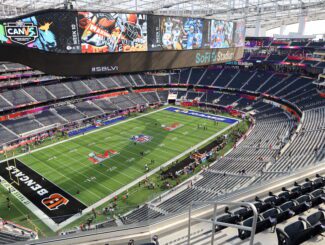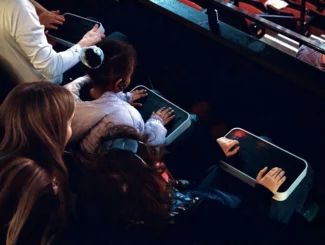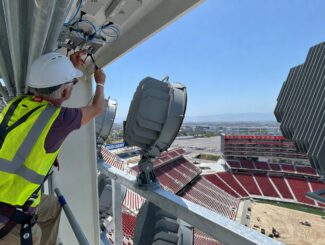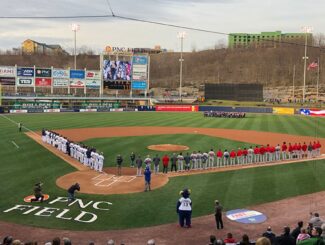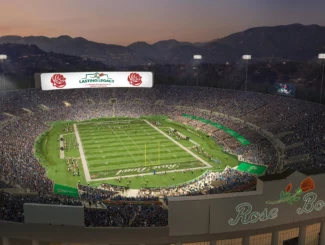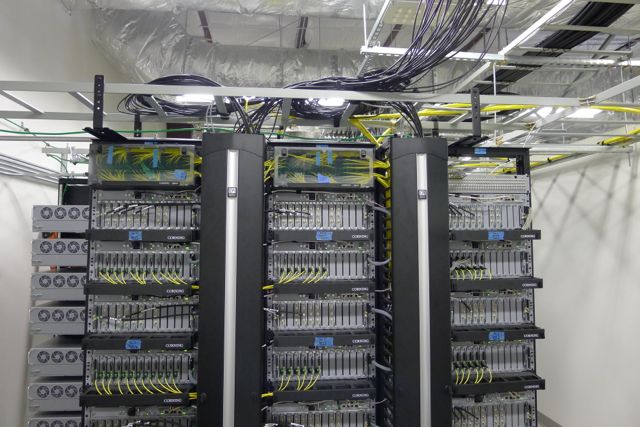
Corning, a company that once supplied gear to some of the largest in-stadium distributed antenna system (DAS) deployments, is getting out of the DAS business completely with the sale of its wireless product division to Airspan, a deal announced today.
According to the Boca Raton, Fla.-based Airspan, it will be acquiring Corning’s 6000 and 6200 distributed antenna system (DAS) product lines, as well as Corning’s SpiderCloud 4G and 5G small cell radio access network (RAN) products. Terms of the deal, which is expected to close in the first quarter of 2025, were not disclosed.
While Airspan does not currently have clients in the stadium market, an Airspan executive said that the company sees the large public venue space as “complementary” to its current businesses, and said it plans to use the Corning gear as a lever to gain customers in the stadium space.
“We see stadiums as a huge opportunity, since there is a great need for 4G and 5G services [in venues],” said Amit Jain, senior vice president and general manager of Airspan’s in-building networks group. “We see the Corning assets as a good product, and we’re excited to have them,” Jain said.
While Corning had previously declined to comment on any such pending plans, the lack of any recent DAS deals by Corning, the sparse recent communication from the company about its DAS business and the competitive changes in the stadium DAS marketplace may all be reasons why the fiber-and-glass giant Corning decided it was time to throw in the towel when it comes to DAS. Still unanswered are questions about the use of technology from China in some of its DAS gear that could be subject to government bans in the future.
Sources who are part of the DAS equipment market who asked to remain anonymous told STR that all of the above issues were pushing Corning to shed its DAS business, in part because it is not a good financial story inside a company whose other product lines, like fiber-optic cabling, ceramics and industrial glass, are doing well. Gains in sales of optical fiber to AI data-processing centers have most financial analysts favorable about the company’s future.
No mention by Corning of its DAS business performance
But what may have been foreshadowing about the company’s latest news is that there was no mention in recent Corning press releases of the Corning DAS business, which once provided gear for a large number of big sports stadiums, like Texas A&M’s Kyle Field, Lucas Oil Stadium in Indianapolis, Mercedes-Benz Stadium in Atlanta and Chase Center in San Francisco.
If you’re not familiar with DAS, it basically is a “neutral” wireless network built so that multiple “clients” — meaning commercial cellular service providers — can share a single physical network of antennas. DAS is particularly attractive in stadium situations, where it would be cost-prohibitive and too complex for multiple carriers to build their own private networks inside a single building. In addition to selling fiber cabling, Corning had its own DAS networking gear line, acquired in 2011 from a company called MobileAccess.
But as many past stadium DAS deployments are currently undergoing upgrades due to the influx of new technologies like 5G cellular and expanded availability of wireless spectrum, there have been no recent announcements of upgrades or new DAS networks using Corning gear. One big customer, the Atlanta Falcons, said they have decided to switch from Corning to CommScope products for new DAS deployments that support 5G.
Overall, the current stadium DAS business is a much different place than when Corning was in its DAS heydays. Technological and spectrum differences between some of the top U.S. wireless carriers in their 5G strategies makes it harder to build a neutral network that can satisfy multiple carriers at the same time. Also, the top U.S. carriers — T-Mobile, Verizon and AT&T — are increasingly reluctant to participate in stadium DAS deployments where they feel the neutral host is asking for network rental fees that are too high.
There is also financial consolidation happening the the stadium DAS business, where well-financed companies whose other businesses align with DAS networks are snapping up smaller DAS concerns, increasing business competition.
Ready to rebuild the reputation
A quick look through the Airspan website does not show any case studies or press mentions of neutral-host networks or DAS deployments inside large public venues. The top three markets mentioned on the company’s home page include public networks, private networks and air-to-ground networks, which include Wi-Fi services to planes.
But according to Jain, Corning had actually been doing fairly well with DAS sales recently in other market spaces, such as health care and transportation hubs.
“We know stadium deals can take a long time, and we need to win back the trust of the customer,” Jain said. “But it’s a good product and we will move one step at a time.”
Use of equipment from China a possible concern?
Other sources interviewed for this story said that Corning’s use of some technology from a Chinese supplier named Sunwave in its newer DAS equipment line may be subject to U.S. government bans in the future. And while there has been no government action as of yet against Sunwave, the ongoing government actions to ban telecom equipment from suppliers including China’s Huawei could create a concern about selling any communications product with Chinese technology inside.
According to Jain, even if some of the parts of the products do come from countries like China, there are no components within the Corning gear that he thinks would be of any U.S. governmental concern.
“Corning was very careful about what they put in [the products] and we are very careful as well,” said Jain, who said that any such components in question were not ones that had any logic controls embedded in them.
In terms of entering the stadium DAS business at a time of great change, Jain did note that unlike Corning Airspan is “a company 100 percent focused on wireless — it’s our only business.” With a 20-year history of working with the largest wireless carriers as well as enterprises, Jain said Airspan sees the stadium DAS business as “complementary to what we’ve been doing, without a lot of overlap.”



